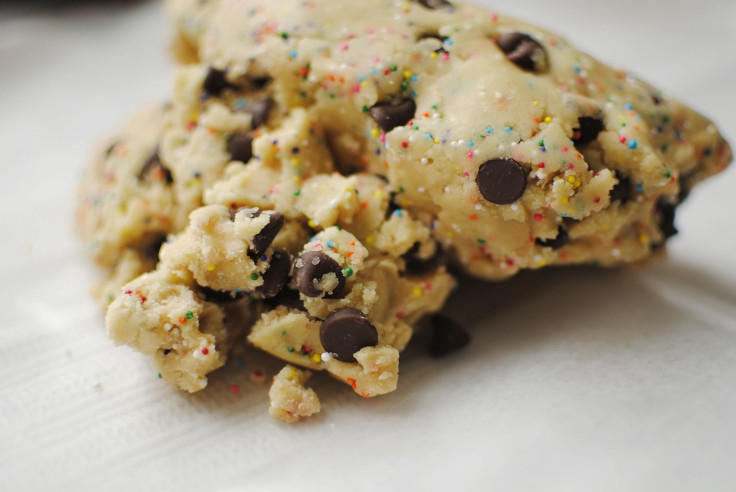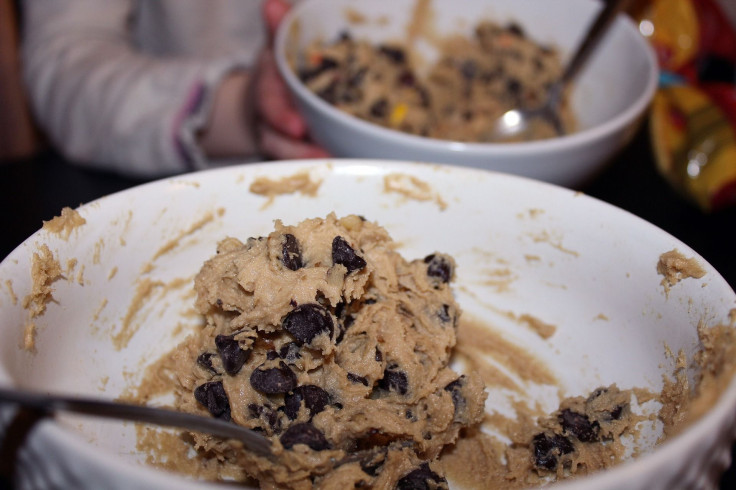Dangers In The Kitchen: FDA Warns Raw Cookie Dough May Carry E. Coli Bacteria, Even If It's Without Eggs

Cookie dough may arguably be the best part about baking cookies with mom or whipping up a batch during the holiday season, but even if the dough is free of raw eggs, you could still wind up sick. Put your spoons down because the U.S. Food and Drug Administration (FDA) just announced the dangers of eating raw cookie dough in response to a recent outbreak of E.coli -contaminated flour. Currently 38 people in 20 different states have been infected by a sickening strain of bacteria, some of whom were in such bad shape they needed to be hospitalized.
“Kids are going to handle it and touch their faces, and they’re going to lick their fingers; it’s hard to supervise that,” said Jenny Scott, a senior adviser at the Center for Food Safety and Applied Nutrition for the FDA. “We want to encourage consumers to report their illnesses, even though it’s an imperfect system. We’d like to have the tests done and get everything reported and identify these outbreaks so we can follow up, discover root causes and make changes in the system so that people don’t get sick in the future.”
In December 2015, victims began reporting E.coli -related symptoms, including severe stomach cramps, bloody diarrhea, and vomiting. Although most sufferers recover after a week or so, those who do not seek medical attention run the risk of experiencing kidney failure. This particular strand of bacterial-infecting pathogen, called Shiga Toxin-producing Escherichia coli 0121, has infected people from 1 to 95 years of age. People at high risk for foodborne illnesses are pregnant women, newborns, children, older adults, and those with weakened immune systems.
After the Centers for Disease Control and Prevention stepped in, experts were able to trace the source of the outbreak to a General Mills facility in Kansas City, Mo., where the contaminated flour was originally produced, packaged, and sent out to grocery stores across the country. Between Nov. 14 and Dec. 3, the company produced 10 million pounds of flour that were sold under the brand names: Gold Medal, Gold Medal Wondra, and Signature Kitchens. So not only are unbaked cookies at risk of carrying the bacteria, so are bread and pizza dough.

Fortunately for cookie lovers, once the dough is exposed to high temperatures in the oven, the E.coli bacteria is killed and no longer remains a threat. Scott said: “For the most part, the risk from flour is pretty low, and most uses of flour involve a ‘kill step’ — people bake with it.”
Aside from contaminated flour, raw cookie dough isn’t all that safe for consumers to begin with.
Even without the risk of E. coli, food safety experts at the FDA warn consumers to restrain themselves from eating the delectable dough raw because the mixed-in eggs may carry Salmonella. In 2014, the U.S. Department of Agriculture (USDA) even issued a statement that warned Americans to resist the temptation and “avoid raw or partially cooked eggs or foods containing raw eggs, such as cookie dough.”
Not only should you avoid eating the ooey-gooey goodness altogether, take it one step further and wash your hands with antibacterial soap before and after handling the dough. Avoid touching your mouth and be sure to thoroughly clean the spoon, bowl, mixer, and any other items that came in contact with it.
Published by Medicaldaily.com



























